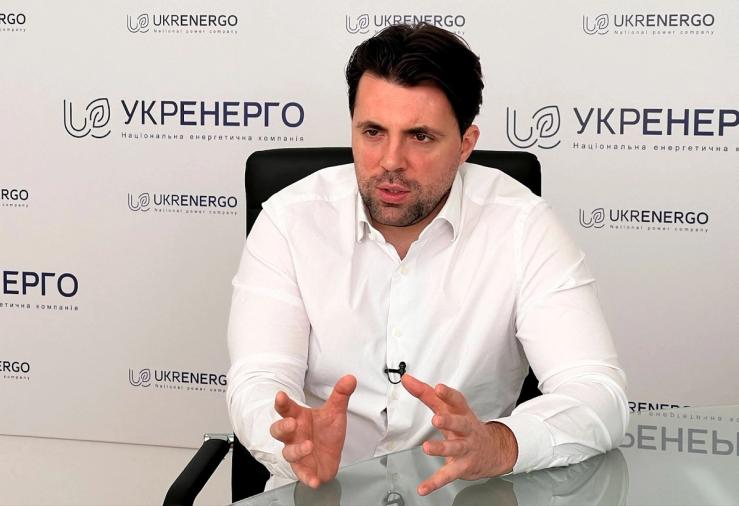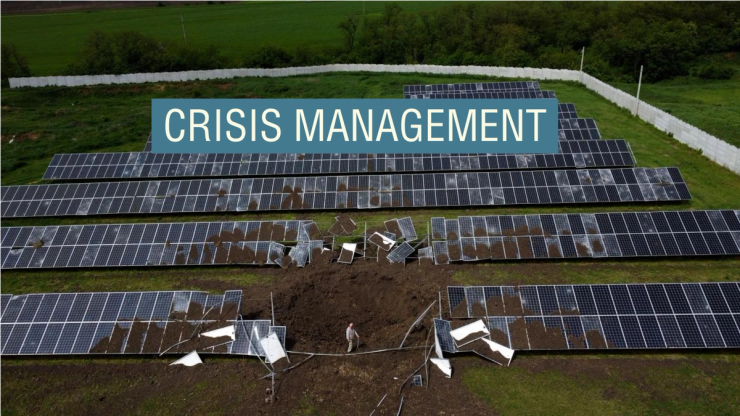The Scoop
Bureaucratic infighting and the slow pace of domestic policy reform pose a major threat to Ukraine’s energy security as the country faces a barrage of attacks on energy infrastructure by the Russian military, the recently sacked head of the country’s state-owned grid company said in an interview.
Volodymyr Kudrytskyi, who had been CEO of Ukrenergo since 2020, was fired by the company’s supervisory board earlier this month over concerns among top officials in President Volodymyr Zelenskyy’s administration that he had failed to do enough to fortify vulnerable grid infrastructure, exposing Ukraine to recurrent nationwide blackouts that are expected to worsen during the winter. But in an interview with Semafor — his first with US media since he was sacked — Kudrytskyi said his dismissal was politically motivated, and stemmed from his opposition to what he saw as inappropriate government overreach into Ukrenergo’s operations.
Kudrytskyi said his firing was representative of a deeper problem: Ukraine’s urgent scramble to restore the half of its power generating capacity that has been destroyed since the 2022 full-scale invasion is impeded by anxiety from Western governments, development banks, and private investors that money and equipment sent to the country could be lost in a “black pit” of state inefficiency and self-dealing.
“If we have an independent and professional [grid] operator, nobody can stop [Ukraine’s energy recovery],” he said. “If the operator is serving the politicians, I have big doubts.”
In this article:
Tim’s view
As Ukraine builds back from devastating waves of attacks on its energy system, the country is in dire need of more money, energy equipment, and defensive weapons. But its biggest challenge may be convincing top energy officials to embrace the sweeping cultural change needed to replace the lumbering, centralized system left over from the Soviet era with a more resilient, privately-owned, and decentralized (not to mention greener) system.
If anything, heavy damage to all of Ukraine’s large coal-burning power plants, most of which are privately owned, has concentrated an even greater share of the energy system in the hands of state-owned companies. In public, Zelenskyy, his energy minister, and other top officials fervently support the push for decentralization, both as an expedient way to rebuild generation capacity and as a way to make the system less exposed to crippling airstrikes. But the prevailing understanding of “decentralized” energy among Ukraine’s leadership, Kudrytskyi said, was for the existing handful of state-owned companies to build dozens of small gas-fired turbines, batteries, and renewable energy farms, rather than opening the economy to a larger number of private investors. I’ve heard the same complaint from many entrepreneurs in Ukraine’s burgeoning private energy development sector. (A spokesperson for the energy ministry didn’t return a request for comment.)
“This is a way to nowhere,” Kudrytskyi said. “But creating an ecosystem, instead of giving out orders, is more complicated, and also means that you’re not able to exercise control of the process.”
Know More

In the last few months the government has made some reforms that should help promote more private investment, Kudrytskyi said, including allowing Ukrenergo to sign long-term power purchase agreements with private developers for the first time, and raising the heavily-subsidized price of power to make investments more profitable. But these reforms are too little, too late, to make a difference ahead of this winter, Kudrytskyi said: “We lost one and a half years, so this winter we will have to face power outages.”
In a briefing this week, Oleksandr Kharchenko, managing director of the Energy Industry Research Center, a Kyiv think tank, said that financial mismanagement is the biggest challenge facing Ukraine’s energy sector, but that Ukrenergo under Kudrytskyi had done better than any other institution in earning the trust and managing the capital of Western donors. Now, that channel of aid could be squeezed or closed. Whether or not there was merit to his firing — Kudrytskyi, for his part, said the accusations against him are “just nonsense” — the fact that it appeared to be carried out through back-door political channels and not through Ukrenergo’s official corporate governance procedure could “jeopardize our collective ability to support Ukrenergo and other priority measures of Ukraine’s vital energy security,” the EU ambassador to Ukraine and the head of the Ukraine office of the European Bank for Reconstruction and Development warned in a letter to Ukrainian Prime Minister Denys Shmyhal.
If the stream of foreign aid does continue, Kudrytskyi said, it should be mostly rolled out as loan guarantees to encourage more private investment, rather than being spent directly on a mishmash of small hardware parts that ultimately make only a small difference in the rebuilding effort. Rebuilding generation quickly is essential for Ukraine’s economy, he said, not just because of the financial toll for businesses of blackouts and buying diesel generator fuel, but also because of forgone revenue exporting electricity to Europe. But most importantly, he said, a steady power supply is prerequisite for the war effort itself.
“You need to have strong morale to continue supporting the front line,” he said. “And these blackouts really lower morale.”
The View From Washington
Separate from the drama over Kudrytskyi’s dismissal, more Western aid to Ukraine is in limbo as the US and Europe continue to disagree about whether and how to tap frozen Russian assets without violating their own laws. Without either a change in Europe’s sanctions laws, or approval by Congress for new US lending, a $50 billion loan package could fall apart by the end of this year.


